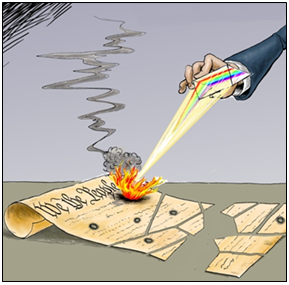An amendment offered by Michigan Republican Rep. Justin Amash to the 2014 Defense Appropriations Act would defund any surveillance to collect communications data “if such things do not pertain to a person who is the subject of an investigation.”
Under current law in Section 215 of the Patriot Act, the FBI and NSA are gathering “tangible things” — such as phone, email, and other communications records — without individual warrants.
Instead, the Foreign Intelligence Surveillance Act (FISA) Court is issuing general warrants to gather intelligence on every single person in the U.S. to be used later, the agencies say, just in case.
The only reason anyone knows anything about those general warrants was because of Edward Snowden, without who the shadow cast by the pervasive surveillance state would remain invisible.
After all, this was a program implemented in secret by the executive branch during the Bush and Obama administrations. It was given legal sanction by secret court orders. It was hidden from members of Congress who did not know how vast the surveillance really was or would be when the Patriot Act was passed and reauthorized.
Now Congress has an opportunity in light of the Snowden disclosures to have a say on the matter — by voting on the Amash amendment to defund it. There is nothing opaque about it now. Members will be voting knowing full well that this is domestic intelligence collection on U.S. citizens whether they are suspected of a crime or not.
“They can no longer hide behind the veil of secrecy,” Americans for Limited Government President Nathan Mehrens said. “This is an up or down vote on whether Congress will allow the FBI and NSA to operate an omniscient secret police or not. The American people cannot afford for members to get this one wrong. No less than the liberty of every single American is at stake.”
Perhaps the real question for members is: In the modern information age, is an omniscient, Big Brother surveillance state the only way to keep us safe?
Yesterday, NSA chief General Keith Alexander called an emergency meeting on Capitol Hill to persuade members to vote against the Amash amendment. Undoubtedly, Alexander was telling members about the program’s successful track record in assisting terrorist investigations.
But even if it were useful, giving law enforcement a cheat sheet to conduct criminal investigations is never a good idea.
As ALG’s Mehrens noted, “Nobody’s records should be collected unless there is specific investigation into that person taking place for crimes that have been committed and a lawful warrant has been issued by a judge upon probable cause.”
Instead, just collecting everything in the event that it might be useful is a clear violation of everyone’s Fourth Amendment rights against unreasonable searches — an infringement of one the most basic freedoms we all hold dear.
In the past, members of Congress could claim ignorance. Now each and every one will be on record as to whether they believe each individual American’s personal data should be collected — just because.
Robert Romano is the Senior Editor of Americans for Limited Government.







